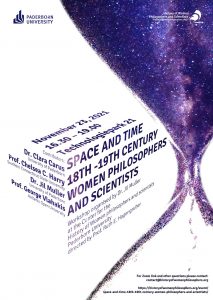 Some weeks ago, Chelsea C. Harry‘s and George N. Vlahakis‘ collective work in the Springer Book Series “Women in the History of Philosophy and Sciences” was published, with the promising title: Exploring the Contributions of Women in the History of Philosophy, Science, and Literature, Throughout Time.
Some weeks ago, Chelsea C. Harry‘s and George N. Vlahakis‘ collective work in the Springer Book Series “Women in the History of Philosophy and Sciences” was published, with the promising title: Exploring the Contributions of Women in the History of Philosophy, Science, and Literature, Throughout Time.
In addition to other scientifically very valuable articles, there is also an article from our Deputy Head, Dr. Jil Muller, on “Space and Time: Mathematical and Moral Thoughts in Sophie Germain and Blaise Pascal”.
“Space and time are geometrical notions that Sophie Germain, a French mathematician, discusses on several occasions in her Pensées diverses, however not only in a geometrical way but also in terms of a philosophical and moral under-standing: she speaks of a human’s lifespan, the space they occupy, their place in creation and the knowledge toward which they always aim. This mixture of mathe-matical and philosophical thinking brings out Germain’s dream: she wants to apply the language of numbers to moral and political issues. As such this chapter aims to examine Germain’s mathematical understanding of space and time in order to discover her moral theory. Furthermore, in a purely hypothetical context (because one does not know which authors she has read), I compare Germain’s moral thinking to Pascal’s moral and mathematical thoughts in Pensées. We underline the possible inspiration by Pascal by highlighting the similarities between these authors concerning space and time, which both treat mathematically and philosophically. These authors agree that time and space can be measured, and thus provide constant and mathematically uniform elements. At the same time, time and space provide the framework for moral thinking. The latter is not “capable” of enjoying the present moment; he is on a quest for the future. For Germain, this results into knowledge, but for Pascal, this is a sign of an unhappy life in which people do not find rest and are constantly looking for a diversion.”
If you are interested, you can find the table of contents and the link to the book here.
You can also listen to some of the interventions on Space and Time of these contributors in our podcast. 
You cannot copy content of this page








